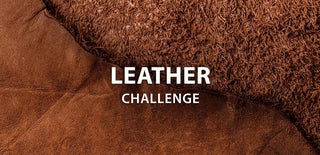Introduction: Simple Leather Carving
Carving a design can be simple if you have a few tools and a little practice. This instructables will guide you through some basic tooling and carving.
Supplies
Materials
- A sturdy surface to work on
- Hammer/mallet
- Swivel Knife
- Vegetable tanned leather
- Stamps
- pear
- bevel
- seeder
- any other designs you wish to use
- Pattern
- Wax paper/tracing paper
- Pencil
- Stencil (I used a nut cracker)
- Sponge
Optional
- scotch tape
- stitching groover
Step 1: Trace the Design
Grab the wax paper and your design. I hand drew one that was similar to practice carvings I've done before. It's easiest to print a design off on-line to use. I attached one that is pretty simple if you want to try it out. It's a little different than the one I did, but feel free to add designs to it as you go along.
Use the wax paper to trace out your design. Place the wax paper over the design and trace over it with a pencil.
Tip: I find it helpful to tape the wax paper down over the pattern.
Step 2: Dampen the Leather
Natural veg tanned leather is a light tan. To help it take shape easier, get the sponge wet (but not dripping) and apply an even coat of wetness to the leather. The color will darken. Wait until the color has lightened close to it's original color before moving on to the next step.
Step 3: Transfer the Pattern to the Leather
Place the wax paper over the leather and use the stencil to lightly trace the image onto the leather. Don't press too hard, just hard enough that when you lift up the wax paper you can see outline of the tracing. Remove the wax paper after you have finished tracing.
Tip: The lines being traced will be cut in the next step. If there is a part you don't want traced, I recommend using dots or dashes instead of a line on those parts to help in future steps. I put dashes in the center of mine because I didn't want to cut there.
Step 4: Cutting the Lines
Hold the swivel knife in a comfortable way similar to how I am. You'll only use a tip of the blade for cutting. Follow the lines you traced and cut them out. You don't need to cut too deep. Use your thumb and middle finger to adjust for curves. Once this is done you can move onto tooling.
Step 5: Tooling the Leather (Pear Stamp)
A common tool is called the pear stamp. This can be used for creating depressions and contours in the leather. I like using it for giving some texture to the inside of leaves and petals. to use this tool (and others) lightly hold the stamp in the place you want to start a depression and firmly tap with the mallet. The tool should have a little bounce to it when it leaves a mark. This bounce can be used to help position the next spot to depress. Slowly work to create a depression in the leather.
Step 6: Tooling the Leather (Bevel Stamp)
A bevel stamp is used to help give depth and and outline shapes. I like to use it around objects to help give them a little pop up or raised look. I went around the outside of the flower and placed the edge of the bevel in the cuts I made earlier. Using the same technique as the pear stamp, slowly make your way around the areas you want to look raised up.
Step 7: Tooling the Leather (Seed Stamp)
Earlier I made some dashes in the leather when I traced the pattern onto the leather. I did this so I knew a little bit where I wanted to add some seed pods to the flower. The seed stamp is designed to look like little seeds. I like to put them in the middle of some flowers to help give it a realistic look and too help the middle of the petals blend together better.
Place the seeder in the and firmly tap the stamp with the mallet to create the seeds.
Step 8: Tooling the Leather (Other Stamps)
Many other tools exist to help make leather designs look more intricate and realistic. The camouflage, veiner, and weaving stamps are some of my favorites. As you get more comfortable with the basics of leather tooling, try out some other stamps for more intricate designs.
Step 9: Optional Grooving
As an optional effect, sometimes I like to outline my design with a groover. This tool is usually used for creating grooves that stiches can go in when sewing leather pieces together. After adjusting the position of the groover, press the groover into the leather and pull towards you, this will cut out a thin strip. I didn't do this for this project, but the third image in this step shows a previous carve I did with the groover outline the flower.
Step 10: Finished
That's it! By know you've carved out and tooled some leather. After doing all this, you're pretty much done unless you want to add in some free hand work. I like to add in a few thin cuts with the swivel knife to help give the carving some added character. Feel free to play around and add extra touches to your master piece.

Participated in the
Leather Challenge











